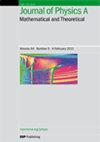多域蛋白质构象动力学记忆的无模型推断
IF 2.1
3区 物理与天体物理
Q2 PHYSICS, MATHEMATICAL
Journal of Physics A: Mathematical and Theoretical
Pub Date : 2024-08-27
DOI:10.1088/1751-8121/ad6d1e
引用次数: 0
摘要
单分子实验有助于深入了解单个蛋白质分子的运动(构象动力学)。通常,测量定义明确但粒度较粗的分子内坐标,然后借助隐马尔可夫模型进行分析,从而推断蛋白质构象变化的动力学。这种方法所依赖的假设是,蛋白质的微观动力学是按照某个网络上的马尔可夫跳跃过程演化的。然而,可观测动态中记忆的表现和程度在很大程度上取决于所选择的基础马尔可夫模型,而这种模型通常是未知的,因此可能导致误解。在这里,我们结合对热休克蛋白 Hsp90 的大量单分子等离子体尺实验、计算机模拟和理论,以无模型的方式推断和量化记忆。我们的分析基于非马尔可夫行为的简单定义,不需要任何基础模型。在等离子体标尺探测 Hsp90 的情况下,我们发现马尔可夫假设在大约 50 秒的时间尺度上被明确违反,这大约相当于推断信号相关时间的 50%。记忆的程度是惊人的,达到了生物相关的时间尺度。这意味着记忆效应甚至可以穿透最慢的观测运动。我们为如何测试单分子实验数据中记忆的存在和持续时间提供了清晰且可重复的指导。本文章由计算机程序翻译,如有差异,请以英文原文为准。
Model-free inference of memory in conformational dynamics of a multi-domain protein
Single-molecule experiments provide insight into the motion (conformational dynamics) of individual protein molecules. Usually, a well-defined but coarse-grained intramolecular coordinate is measured and subsequently analysed with the help of hidden Markov models to deduce the kinetics of protein conformational changes. Such approaches rely on the assumption that the microscopic dynamics of the protein evolve according to a Markov-jump process on some network. However, the manifestation and extent of memory in the dynamics of the observable strongly depends on the chosen underlying Markov model, which is generally not known and therefore can lead to misinterpretations. Here, we combine extensive single-molecule plasmon ruler experiments on the heat shock protein Hsp90, computer simulations, and theory to infer and quantify memory in a model-free fashion. Our analysis is based on the bare definition of non-Markovian behaviour and does not require any underlying model. In the case of Hsp90 probed by a plasmon ruler, the Markov assumption is found to be clearly and conclusively violated on timescales up to roughly 50 s, which corresponds roughly to ∼50% of the inferred correlation time of the signal. The extent of memory is striking and reaches biologically relevant timescales. This implies that memory effects penetrate even the slowest observed motions. We provide clear and reproducible guidelines on how to test for the presence and duration of memory in experimental single-molecule data.
求助全文
通过发布文献求助,成功后即可免费获取论文全文。
去求助
来源期刊
CiteScore
4.10
自引率
14.30%
发文量
542
审稿时长
1.9 months
期刊介绍:
Publishing 50 issues a year, Journal of Physics A: Mathematical and Theoretical is a major journal of theoretical physics reporting research on the mathematical structures that describe fundamental processes of the physical world and on the analytical, computational and numerical methods for exploring these structures.

 求助内容:
求助内容: 应助结果提醒方式:
应助结果提醒方式:


